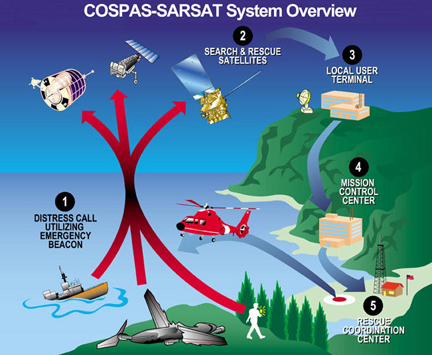
COSPAS-SARSAT diagram
All yachts in, or likely to be in South African waters, are recommended to take note. Here is their announcement:
All ships are required to carry onboard as part of their GMDSS fit an Emergency Position Indicating Radio Beacon (EPIRB). When the ship is in distress and the beacon is activated the emergency beacon will transmit a signal. The signal is then relayed through a COSPAS-SARSAT satellite to the Local User Terminal/Mission Control Centre (MCC), which in the South African context, is the Telkom Maritime Radio Station situated in Milnerton, Cape Town. The signal is processed by the MCC and then automatically forwarded to the MRCC, Cape Town. The MRCC will investigate, and if required, will co-ordinate a SAR operation.
These operations range from routine Maritime Assistance Service, such as towing operations and vessels not under command but in no immediate danger, to vessels in distress where the loss of life, pollution, etc. is imminent. It must be stressed that the emergency beacons alone cannot be effective unless supported by lifesaving equipment e.g. life rafts, lifeboats, life jackets, life buoys, immersion suits, and life floats, among others. It can take considerable time before the rescue units reach the distress position and therefore the aforementioned equipment can help to prevent unnecessary drowning or death. Without an EPIRB onboard it becomes extremely difficult to locate a vessel that was not able to relay its position, thus making the rendering of assistance a more complicated and lengthy process.
The EPIRB must be programmed with a Maritime Mobile Service Identity (MMSI) which is issued by the Independent Communications Authority of South Africa (ICASA). The Master or operator must ensure that the EPIRB is always serviceable and ready to be deployed should it become necessary. In South Africa all ships of South African nationality are required to have an EPIRB onboard at all times, wherever they may be. All other vessels not covered by the provision of the Act should however endeavour to carry a properly registered and programmed EPIRB as an additional safety measure.

